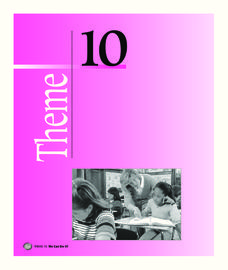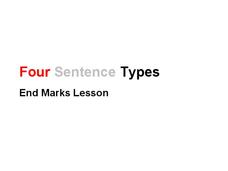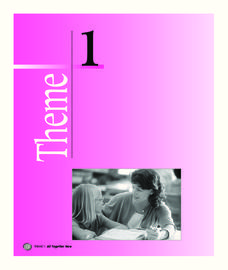Core Knowledge Foundation
First Grade Skills Unit 7
The last unit in the series by Core Knowledge focuses on alternative spellings, nouns, verbs, conjunctions, subject-verb agreement, using commas in a series, constructing sentences, and following the writing process while writing...
Core Knowledge Foundation
First Grade Skills Unit 6
A unit explores alternative spellings, ways to include nouns, pronouns, adjectives, and prepositions in sentences, and writing personal narratives. Over 25 lessons, first graders participate in whole group and small group instruction....
Core Knowledge Foundation
First Grade Skills Unit 5
Twenty-two lessons make up a unit that focuses on first-grade skills. Scholars examine spelling alternatives—their rules and patterns, practice tricky spelling and high-frequency words, explore plural nouns and sentences, read a...
Core Knowledge Foundation
First Grade Skills Unit 4
Twenty-eight lessons make a unit that focuses on skills practice. Lessons explore r-controlled vowels, past tense verbs, nouns, adjectives, and two-syllable words. Pupils read a story, answer questions, and draft a descriptive essay...
Core Knowledge Foundation
First Grade Skills Unit 3
Four weeks, 19 lessons—this unit covers five new vowel spelling patterns, tricky words, spellings, verb tenses, reading fables and exploring the writing process. Lessons offer review, an introduction to the concept, skills practice,...
Core Knowledge Foundation
First Grade Skills Unit 2
Nineteen lessons make-up a four-week-long unit that explores long vowel sounds, nouns, and 11 high-frequency words. Lessons scaffold information to gain confidence in reading a decodable text and answering questions. Routines include...
National Council of Teachers of English
Writing Poetry with Rebus and Rhyme
Young scholars write rhyming poems using rebus. With pictures instead of words, authors create original work about things they love.
Read Write Think
Poetry Portfolios: Using Poetry to Teach Reading
Over the course of five periods, scholars create a poetry portfolio. They begin with a reading of the poem, Firefly. With a focus on vocabulary, learners reread the poem then look for sight words and other skills.
Houghton Mifflin Harcourt
We Can Do It!: English Language Development Lessons (Theme 10)
English language development lessons are brought to you in poems, picture cards, and grand discussions in a We Can Do It! themed unit. Topics of discussion include daily challenges, parts of a whole, words that describe what we hear,...
Houghton Mifflin Harcourt
Special Friends: English Language Development Lessons (Theme 9)
Enhance language proficiency with a Special Friends themed English language development unit. Each lesson follows a listen, speak, move, and/or look routine that is guaranteed to get your scholars discussing topics such as animal...
Houghton Mifflin Harcourt
Home Sweet Home: English Language Development Lessons (Theme 5)
Through grand discussion, picture cards, and poems, enhance language proficiency with a Home Sweet Home themed unit created to support English language development. Each lesson follows a listen, speak, move, and/or look routine that...
Houghton Mifflin Harcourt
Family and Friends: English Language Development Lessons (Theme 4)
Family and Friends is the theme of a unit consisting of English language development lessons. Reinforce language proficiency, particularly in family vocabulary, basic needs, feelings, short vowel sounds, blending, reading high frequency...
Curated OER
Four Sentence Types: End Marks Lesson
Give sentence type instruction a boost with this informative powerpoint presentation! Learn about the four types of sentences; imperative, exclamatory, interrogative, and declarative, then check for understanding with a 10-question pop...
Houghton Mifflin Harcourt
All Together Now: Extra Support Lessons (Theme 1)
All Together Now is the theme of this series of extra support lessons. The collection aids the instruction of blending sounds and reading high-frequency words through writing and reading sentences. Support also engages pupils in...
August House
The Ogre Bully
English language arts, math, science, dramatic arts, and cooking; this lesson plan has it all! In this multidisciplinary resource, your scholars will take part in a read aloud of The Ogre Bully by A.B. Hoffmire and have a grand...
Curated OER
Big Grammar Book
With this comprehensive language arts resource in your arsenal, you'll never have to look for another grammar activity! Whether you're teaching kindergartners how to write the upper- and lower-case letters of the alphabet, or helping...
Lesson Plansos
Guided Reading Activities with Pizzazz
Get the most out of your guided reading lessons with this collection of literacy materials. Offering a system for using color-coded tags to mark pages while reading books, as well as an assortment of comprehension and grammar worksheets,...
Lakeshore Learning
Fun in the Snow
Celebrate the arrival of winter with a reading of Jack Ezra Keats' book The Snowy Day. Engaging children by asking them about their own experiences in the snow, the teacher goes on to read the story aloud before asking the class to draw...
Laura Candler
ABC’s of Me!
Young authors share all about themselves with this printable autobiography resource. Including 26 different sentence frames, one focusing on each letter of the alphabet, students write about everything from an adventure they would like...
Tobii Dynavox
Sono Flex
Empower nonverbal learners with the gift of gab using this speech and language application. Offering hundreds of picture-supported words and phrases, it's easy for students who struggle with verbal communication to have meaningful...
Curriculum Corner
“I Can” Common Core! 1st Grade Language
Support first graders with developing their basic language skills using this Common Core checklist. With each standard rewritten as a positive I can statement, students are encouraged to work hard toward reaching these clear learning...
Scholastic
Quick as a Cricket Lesson Plan
Teaching young learners about similes is easy as pie with this primary grade language arts lesson. Following a class reading of the children's book, Quick as a Cricket by Audrey Wood, young readers learn the definition of a simile as...
Curated OER
Punctuation and Proper Capitalization
Young scholars write a declarative and an interrogative sentence and capitalize the first words in the sentences, then use the correct punctuation. They write two complete sentences.
abcteach
Story Starter: Stop Sign
If you're looking for simple writing prompts for young children then stop right there, because we have what you need. Including a picture of a stop sign and four sets of handwriting lines, this exercise asks young writers to produce...

























